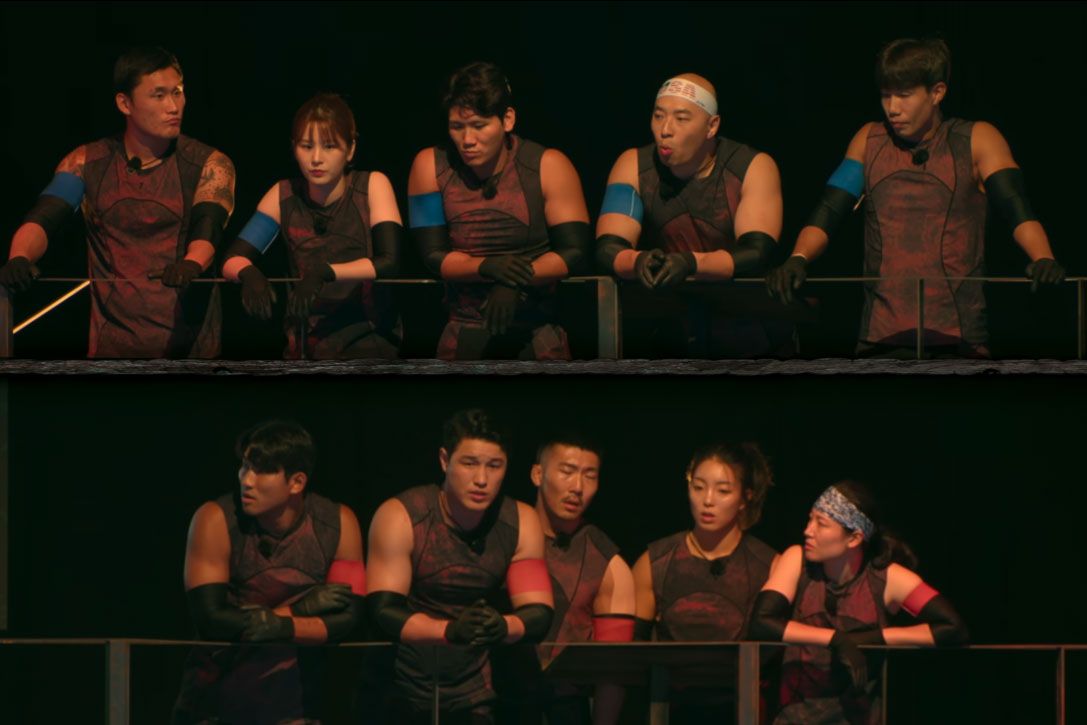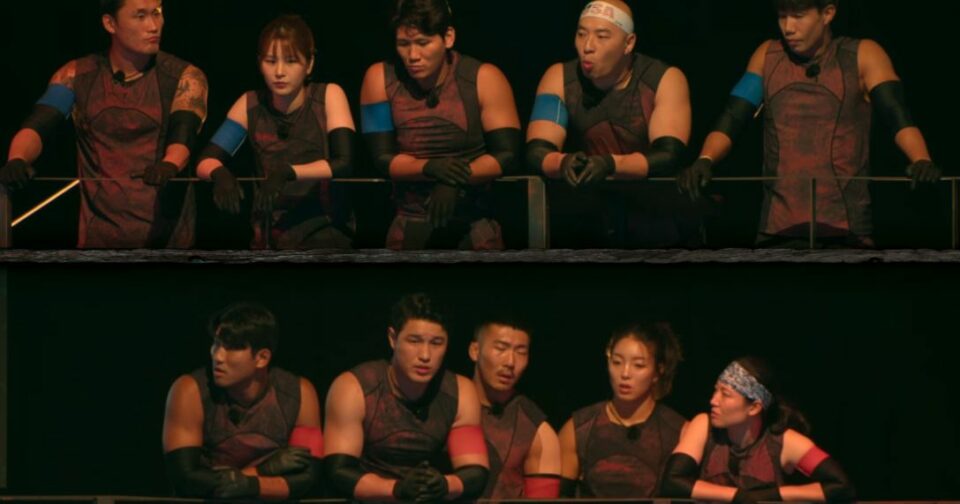
When our childhood recesses turned into gym classes and adolescent sports games, we lost the unstructured hang. Gone are the days of pinwheeling around vault bars, duking it out in sandy tetherball pits, and throwing ourselves off swings then counting the seconds of hang time. Some of us turned these movements into competitions, crowning winners based on senseless points systems and ever-changing rules before running into our classrooms; the glory would matter only until lunch when we would dream up new challenges. We could fit a whole quest into 20 minutes of recess as kids.
Don’t you miss that? I don’t mean the literal swings, rickety bridges, and monkey bars, but the joy in inventing inane games that test our physicality. Today the pursuit of fitness can make one feel like a hamster. Move to any metropolitan area and the only steady co-ed fitness options tend to be gym classes, hermetic adult obstacle courses in dilapidating indoor malls, and recreational sports leagues ranging from soccer to … dodgeball. At best they can become humdrum, and at worst, embarrassing.
Isn’t this why we revel in Physical: 100? In its second season, the popular Korean competition show welcomes 100 Korean-speaking competitors (one of whom returns from the first season) to compete in a series of new individual and team challenges to test their strength, agility, endurance, strategy, and spirit until there is one champion left standing. The winner leaves with around $280,000, but winning this show does not yield national esteem, a meeting with the nation’s leader, or a parade. There is no advancement in one’s athletic career after participating. Contestants are fueled by community, competition, and, perhaps most of all, a sense of fun in fitness. As a result, Physical: 100 gained its popularity from the contagious delight of watching people enjoy themselves like children competing on a playground.
As a former run-amoker, I now regularly lift weights as my sentient hamster exercise of choice. I love tearing away at my sinewy stabilizer muscles while working at a bench press, and the soreness that becomes a source of pride in my movement. However, there are not many spaces for me to show off what I gain from doing deadlifts and snatches because I am not a conventional athlete. Even after triumph, my personal records are simply just that — personal and contained to the four walls of my LA Fitness. Physical: 100 allows me to imagine a more joyful, less-structured fitness environment where competition and camaraderie serve my personal growth — even if parts of the series’ culture still too closely resemble our own.
Season two’s quests continue to be imaginative, ludic, and delightfully pointless. We have seen a combination maze run-sandbag haul, an elaborate mine set with monkey bars and more sandbags, an elimination round where players painfully hang on to a bulky wooden pole, and a race lugging giant 330 pound rollers. It strikes an impressive balance of dreaming up ridiculous challenges while also taking its competitors seriously. There is none of the slapstick of Wipeout or the obnoxious pyrotechnics of American Ninja Warrior. Physical: 100 means business.
In continuing the idea of fitness as play, Physical: 100 recruited more general fitness enthusiasts — the chosen hamsters! — this season. Alongside the increase in national teams (it’s an Olympic year, after all), the show welcomed unconventional competitors like a porter, a broadcaster, a cosplayer, and an arborist, all of whom arrived without a massive social following. Other competitors included MMA fighter Kim Dong Hyun and quadruple judo champion Lee Won Hee, both of whom have retired from their sports and make a livelihood as a television personality and the head coach of the Korean Women’s Judo National Team, respectively. After reaching a certain age, retired athletes have just as many outlets as generalists do to compete. I can only imagine how exciting Physical: 100 must be for them; they don’t typically have non-competitive spaces to show off after hanging up their hats. Season two makes a meaningful step forward in the show’s commitment to showcasing different types of athleticism and bodies. We’ve since learned that fitness enthusiasts are just as entertaining as professional athletes.
As imaginative as the quests are, however, Physical: 100 hasn’t figured out how to retain fitness enthusiasts past early rounds. New rules in season twoallowed for an elimination round where the winner formed a new team from a pool of 24 other contestants who were eliminated after the first team quest. Unfortunately, the recruitment strategy for teams favored conventional strength and physique over skills and strategy, which ultimately resulted in the elimination of women and generalists without well-worn fitness accomplishments. It also allowed for five of the most feared competitors to band together after Greco-Roman wrestler Jung Ji Hyun won and opted to create the human Monstars. This team is easy to hate because the alliance belies the competition, and their combined strength and agility are overshadowed by their faux humility. Yet I wholly understand Hyun’s rationale to rebuild a stronger team out of spite (a very Korean trait) for almost being kicked out of the game so early by less physically muscular teams.
My irritation lies beyond the team’s makeup, though. Just one year ago, Physical: 100 was a show about the all-encompassing range of our bodies. The first season didn’t always reward displays of brolic feats. Part of its appeal was that men like Kim Min Su (a.k.a. Thanos) may not be as good at pushing a minecart full of 90-pound sandbags as the considerably smaller rugby player Andre Jin was. Ultimately, Physical: 100 stays true to its twists in rules and breaks up the Monstars by episode eight, when each team has to compete among their own teammates to secure a spot in the final four, but it’s already too late for many of the more exciting and less-conventional competitors who are gone much too soon.
I must be frank here: Physical: 100 has a sexism problem. Despite the admirable and jaw-dropping, chest-tightening, life-reevaluating-ly hot male contestants, season two would be a wash without players like Lee, who was the only team leader with some sense of wisdom and class in the game. He chose a woman first to be on his team, let alone a judoka that he currently coaches. It shouldn’t be heartwarming, but it is because the other male team leaders are not looking to build a well-balanced team in the Physical: 100 world. They don’t start to pick women until they “have” to. It’s an attitude that shortchanges viewers, but also the teams themselves since many of the women are incredible competitors. Take Lim Soo Jin, a well-decorated professional bodybuilder who hoisted nearly a ton’s worth of sandbags into her minecart through a series of intense cleans, then pushed it across a track with such grace that it wowed her male rivals. So far, the answer from Physical: 100’s producers seems to have been to say “Oh, well!” and then move on from profiling the female contestants after putting the majority of the women’s one-on-one matches in a sped-up compilation. These are the times when I feel pretty bummed about this season. I already come in jealous of these contestants and sad that play is noticeably absent from our discourse around fitness, but I see how even seemingly progressive fitness competitions can fail bodies that look like mine.
Thankfully, this season’s small triumphs are far more resonant than its fumbles. A year from now, I won’t remember how Jung’s strategically formed team tried to steamroll the competition (I will definitely get into kabaddi, though), but I will remember how female MMA fighter Shim Yu Ri challenged and defeated U.S. federal agent Hunter Lee in a cage match. Or how Kpop idol Lee Jang Jun — immediately dismissed by others as a pretty face — exhausted fan favorite Hong Beom Seok in the agility gym. Or how high school wrestler Jang Jun Hyuk went head-to-head with Jung, who won gold in the 2004 Olympics before Jang was even born. These matchups don’t happen outside of their own cages, gyms, and dojangs. As athletes and conventionally fit contestants discover their own limits in a new arena, we are equal witnesses to the thrilling range and depth to our bodies.
So despite it all, I’m still inspired. Here I am grittily hoisting groceries from the trunk of a car to the house in one go, or pushing furniture across apartment building hallways to avoid extra labor charges from the moving van, increasingly becoming hyper aware of how all my Sisyphean movements could make for exciting games, too. In the end, Physical: 100’s contestants seem most fulfilled completing challenges together when they would otherwise be spinning their hamster wheels in their respective individual sports and professions. It addresses a need in our fitness community for gathering grounds without the cultishness that comes from loving a singular sport or exercise. We love to be challenged and love plot twists even more. We embrace questions like, “Can the moving van guy do more pull-ups than me?” and then actually having the space to see. These are inquiries of imagination that take the movements that we already do in real life and put them in the context of play.
Just like how much we need “third spaces” for teens and young adults to hang outside of the house, I want fitness culture to find more spaces for low-stakes, unstructuredmovement, where people of all bodies are welcome to stretch, sprint through, or throw someone else around. Let’s repurpose parks and public spaces to install quests that are open to the public. Let’s put a Cybertruck in the middle of a parking lot and challenge people to put the largest dent in it. From there, let’s allow new rules to unfold, and let the winner go home and say that they were celebrated for accomplishing something dumb and pointless but giving everyone a good show. I’d rather do that than join a “just moved to L.A.!!” group cloaked as an intramural sports league.
Oh, God … did I just make a tiny case for CrossFit? Congratulations to Amotti, I GUESS.
By Lisa Kwon , 2024-04-06 00:04:59
Source link


